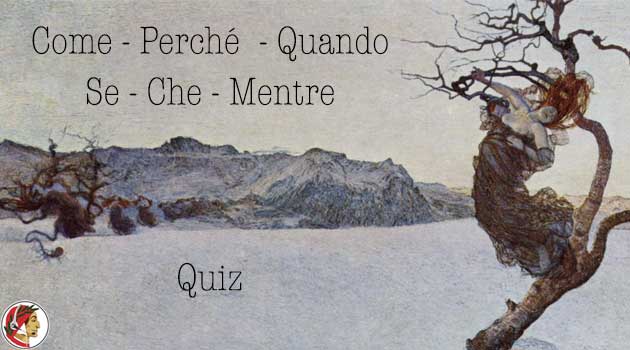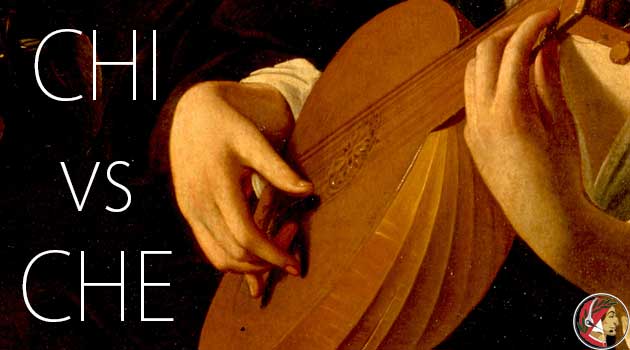Abbiamo già parlato di congiunzioni. Oggi ne studieremo in dettaglio alcune
Chi segue questo blog ha già probabilmente letto alcuni articoli sulle preposizioni, gli avverbi e i connettori.
Oggi vedremo nel dettaglio alcune congiunzioni subordinative e le loro funzioni principali.
Non spiegherò il significato delle singole frasi. So che alcune saranno difficili da capire. Se avete domande, scrivete pure nei commenti e vi risponderò volentieri. Se siete miei studenti, ne possiamo parlare su Skype.
Come
La congiunzione come, può introdurre:
- Un paragone – Non è difficile come credevo.
- Un modo – Tratterò la tua macchina come fosse mia.
- Tempo – Come sono arrivato a casa, ho fatto una doccia.
- Una dichiarazione – Gli abbiamo spiegato come fossimo dispiaciuti.
- Interrogativa indiretta – Spiegami come hai perso il portafoglio.
Ovviamente, possiamo usare come in funzione di avverbio. Come stai?
Perché
Oltre alla consueta funzione interrogativa, perché, usato come congiunzione, introduce:
- Una causa – Mi sono perso perché non conosco la strada.
- Uno scopo – Te lo dico, perché tu possa farti un’idea.
- Una conseguenza – E’ un film troppo stupido perché ti possa interessare.
- Interrogativa indiretta – Dimmi perché sei arrabbiata.
Quando
Ovviamente, quando è strettamente legato al concetto di tempo, ma può introdurre diverse situazioni.
- Tempo – Usciremo quando la partita sarà finita.
- Tempo (iterativo) – Quando vado a Roma, dormo sempre a Trastevere.
- Valore condizionale – Quando si verificasse questa situazione, saremmo pronti.
- Un contrasto (avversativo) – Hai deciso di parlare, quando potevi farti i fatti tuoi.
- Una causa – Mi chiedi sempre di cucinare, quando sai che non ho tempo.
- Un’esclamazione (sospesa…) – Quando uno è fortunato!
- Interrogativa indiretta – Dimmi quando arriverai.
Se
Anche “se” è abbastanza interessante. Introduce:
- Una condizione – Se hai voglia, chiamami.
- Esclamazione – Se solo sapessi!
- Una causa – Se volevi venire, dovevi dirlo.
- Una concessione: Anche se potessi, non cambierei città.
- Interrogativa indiretta – Non so se avete tempo per la mostra.
Che
La congiunzione che, è probabilmente la più interessante. Può introdurre:
- Una causa – Copriti che fa freddo.
- Una dichiarazione – Laura ha detto che non viene.
- Uno scopo – Ho lasciato le chiavi sul tavolo così che tu le veda.
- Uno scopo (italiano colloquiale) – Mangia, che diventi grande.
- Tempo – Era da tanto che non mi divertivo così.
- Una conseguenza – Ero così stanco che mi sono addormentato sul treno.
- Un paragone – Preferirei camminare che correre.
- Un’eccezione – Non fa che guardare la tivù.
- Un limite – Che noi sappiamo, i vicini sono in vacanza.
Inoltre, che può servire come:
- Pronome relativo – Il libro che ho letto è interessante.
- Pronome / aggettivo interrogativo – Che stai facendo?
- Pronome / aggettivo esclamativo – Che bella città Padova!
Mentre
Mentre, introduce:
- Tempo – Mentre corro, ascolto un podcast.
- Un paragone (avversativo) – Dormi tutto il giorno, mentre dovresti darti da fare.
- 1
- Answered
- Review
-
1. Question
Scegli tra
come, perché, quando, se, che, mentre
Livello: intermedio
* puoi scrivere perché —> perche’ con l’apostrofo se non hai la tastiera italiana.
-
- Mio figlio maggiore studia medicina mia figlia studia psicologia.
- Non sai mi dispiace di non averti chiamata.
- Non si telefona si è a tavola.
- Mi chiedo la prossima volta arriverai ancora in ritardo.
- Ti domandi mai il capo indossi sempre la solita cravatta?
- Tu hai un bel lavoro tranquillo, io faccio fatica a campare.
- Tuo padre lavora la domenica tu possa studiare.
- Apri le tende entra un po' di luce.
- Tu e i tuoi amici non fate criticare gli altri.
- tutti possano vedere la partita, è necessario andare al bar.
-
Opera d’Arte: Giovanni Segantini – Le cattive madri – 1894


